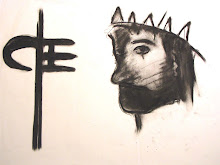My friend the philosopher Peter Boghossian set me this problem:
If we think about the Allegory of the Cave, it is the world of opinion
and ignorance (an irrational society) that prompts a Socratic figure
to emerge and begin questioning it. So it is, apparently, possible
for a Socrates to arise in the cave. How can I reconcile this--if he
can arise in Plato's cave, then can he not arise in a completely
irrational society?
--and ignorance (an irrational society) that prompts a Socratic figure
to emerge and begin questioning it. So it is, apparently, possible
for a Socrates to arise in the cave. How can I reconcile this--if he
can arise in Plato's cave, then can he not arise in a completely
irrational society?
How can the philosopher emerge in the world of the cave – in the world
of opinion and ignorance – in the world of fanaticism and dogmatism –
in an irrational society?
In brief, how can philosophy emerge at all? – You are asking about the
origin of philosophy. You are asking: how can reason emerge from
unreason? How can questioning emerge from a world without questions?
Here is a discussion about this problem – at least some thoughts to begin.
Plato is a source for the saying that philosophy begins in wonder
(thauma) – this is from the Theaetetus. This seems an odd thing to
say about philosophy in that its problems have such depth and
seriousness about them. They seem out of joint with such an innocent
and playful thing as wonder or curiosity. Plato also mentions (Rep
475c) that the philosopher, once he gets going, does not desire just a
part of wisdom, but all wisdom – which suggests that this deep-diving
thing we are calling philosophical questioning could begin innocently
with something like curiosity and quickly grow into an all-consuming
passion. This suggests that the big problem with philosophy is not
its origin but its growth into a comprehensive attitude – from one
question to all questions. The two first moments here are: wonder as
a provocation, and questioning that has its own momentum.
It seems clear that for Socrates, Plato and Aristotle, philosophy
comes up in the individual, and is impelled by or emergent from
powerful thoughts – thus the first philosophers were amazed by the
natural world and began from this awe or amazement to try to build an
explanation. The first phase of Greek philosophy is cosmology, which
at first is barely a step away from religious mythologizing and
storytelling. But cosmology becomes ethics – questions about the
natural world become questions about the everyday world of people and
society – metaphysics becomes political philosophy. In general the
trend is to get from questions about nature to questions about
society. This means: people in the cave begin thinking about the
nature of the cave (out of wonder and curiosity) and gradually begin
to question the cave society -- the social arrangements that they
themselves participate in in the world of social life.
If we look at other traditions we get a few more ideas about
starting-points. In some cases, chaotic social conditions seem to
precede creative thinking about how society should be arranged
(Confucius). In some cases, a willingness to take an argument from
simple premises to ultimate conclusions – the passion for pursuing an
argument all the way to the end – seems the key factor in the birth of
philosophy (the Upanishadic thinkers). For the Buddha, thinking
begins with suffering. Suffering is made into a problem and the kind
of thinking that is created lends itself to all sorts of
problem-making – to philosophical questioning in general.
The Indian tradition seems in many places to suggest the idea that
philosophy begins in the problem of self-control. By trying to get a
handle on all the different thoughts and feelings and impulses
coursing around in our brains/hearts/bodies, we have created the
conditions for explicit thought and philosophical questioning
The Chinese tradition seems to suggest that philosophy has a social
origin and in effect is the result of the break-up of dynasties --
government officials lose their offices and are scattered into
different provinces, where they begin to teach in a private capacity
what they were once required to do in an official capacity – high
officers become literati, soldiers become moralists, astrologers
become metaphysicians. This is an ancient explanation for what people
call “the hundred schools” – it comes from Ssu-ma Chien and more
recently was restated by Fung Yu lan.
So: a social origin; a subjective origin; wonder at the natural world;
facing harsh reality and trying to come up with ideas to ameliorate
things, to solve problems. Another idea that I have written about and
that I associate with African philosophy is the idea that there is
something like a philosophical instinct that comes up in everyone,
especially in children, which then gets repressed and becomes replaced
by religious teaching. This model suggests that virtually everyone in
the cave has the impetus to become a Socrates, without any contact
with anyone else, simply by being human. They will get there unless
they are explicitly prevented from doing so.
I think many of us have the experience of growing up in irrational,
dysfunctional families (really, the only kind there are) and out of
the chaos of family life and all its pressures, we begin to hear a
“still small voice” that urges us to think for ourselves. I think I
had an experience as a child, listening to what the adults around me
were saying, when I suddenly understood that I was the most thoughtful
person under this roof; if anyone is going to do some thinking here,
it’s going to have to be me. So in the darkness of my little corner
of the cave, philosophy got started one more time.

No comments:
Post a Comment